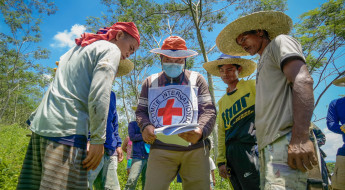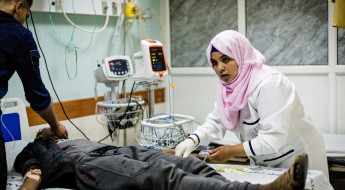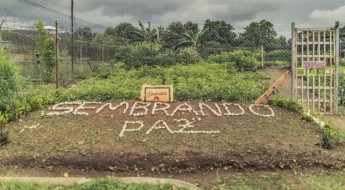Haiti: Improving detention conditions remains a priority
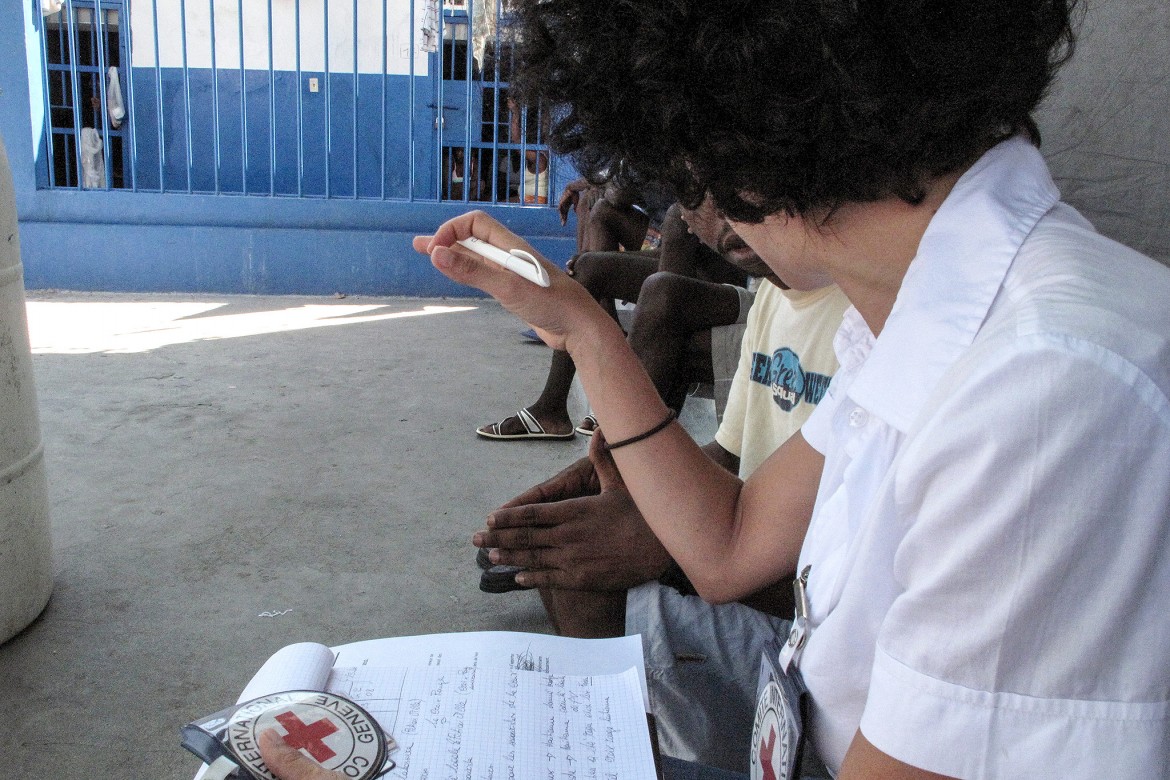 Cayes civilian prison, 2012. ICRC delegates have unimpeded access to all detainees, with whom they can meet privately in their cell. The ICRC has been regularly visiting detention centres across the country since 1994. Delegates meet directly with the detainees, gathering valuable information on the problems they face. Since January 2010, the ICRC has visited more than 11,000 people in prisons and police stations in Haiti.CC BY-NC-ND / ICRC / J.J. Charles / ref ht-e-00750
Cayes civilian prison, 2012. ICRC delegates have unimpeded access to all detainees, with whom they can meet privately in their cell. The ICRC has been regularly visiting detention centres across the country since 1994. Delegates meet directly with the detainees, gathering valuable information on the problems they face. Since January 2010, the ICRC has visited more than 11,000 people in prisons and police stations in Haiti.CC BY-NC-ND / ICRC / J.J. Charles / ref ht-e-00750 Port-au-Prince civilian prison, 2014. The ICRC’s hygiene-promotion team explains to detainees how fecal-oral diseases are transmitted and the importance of washing their hands. This team, made up of an engineer and a nurse, monitors these diseases and makes sure appropriate hygiene and sanitation measures are put into place. It also raises awareness among detainees and prison officials about the importance of good hygiene and is ready to act in the event of a cholera outbreak. In 2015, employees of the prison administration will be trained so that they can independently ensure that proper hygiene is being practiced.CC BY-NC-ND / ICRC / J.J. Charles
Port-au-Prince civilian prison, 2014. The ICRC’s hygiene-promotion team explains to detainees how fecal-oral diseases are transmitted and the importance of washing their hands. This team, made up of an engineer and a nurse, monitors these diseases and makes sure appropriate hygiene and sanitation measures are put into place. It also raises awareness among detainees and prison officials about the importance of good hygiene and is ready to act in the event of a cholera outbreak. In 2015, employees of the prison administration will be trained so that they can independently ensure that proper hygiene is being practiced.CC BY-NC-ND / ICRC / J.J. Charles Port-au-Prince civilian prison, 2012. Campaign against scabies and intestinal worms. To fight the spread of scabies, the ICRC, in conjunction with the prison authorities, carries out periodic campaigns to treat detainees for these parasites in detention centres across the country.CC BY-NC-ND / ICRC / J.J. Charles
Port-au-Prince civilian prison, 2012. Campaign against scabies and intestinal worms. To fight the spread of scabies, the ICRC, in conjunction with the prison authorities, carries out periodic campaigns to treat detainees for these parasites in detention centres across the country.CC BY-NC-ND / ICRC / J.J. Charles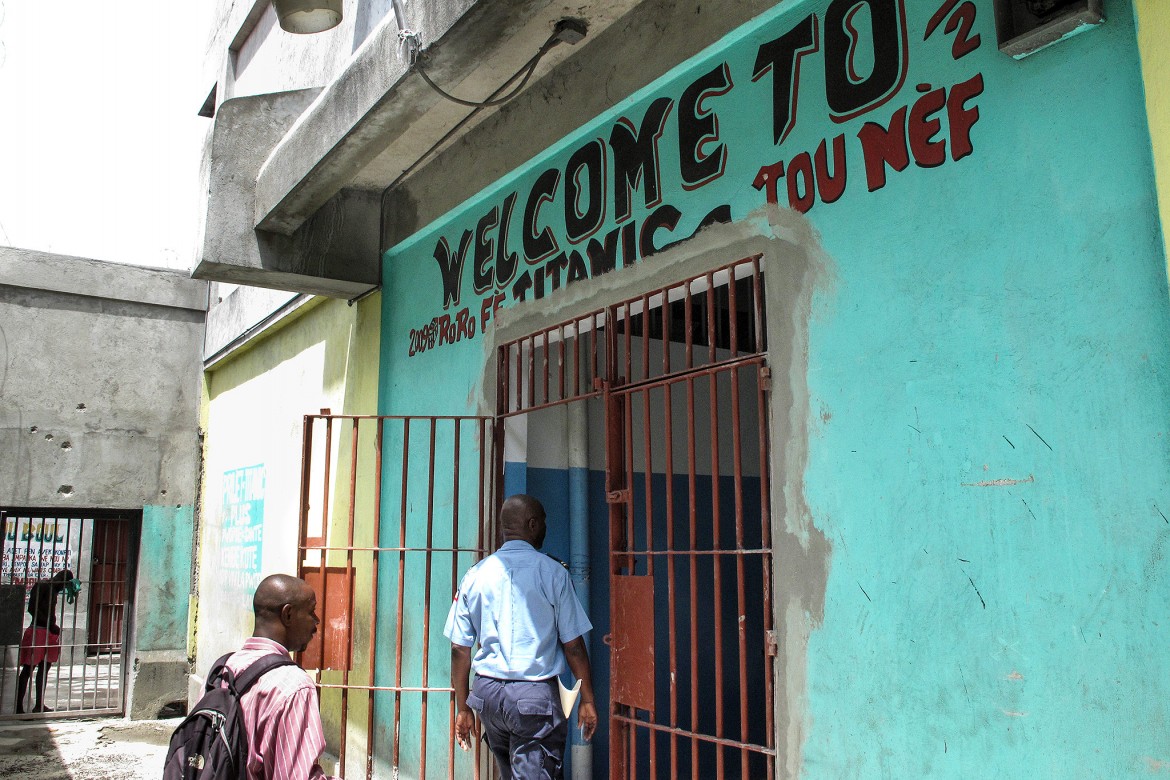 Port-au-Prince civilian prison, 2011. The entrance into Titanic, the main block in the Port-au-Prince prison. The Port-au-Prince prison – the largest penitentiary in the country with over 4,000 detainees – was severely damaged by the 2010 earthquake. This only exacerbated existing problems of overpopulation. Renovating Titanic is the ICRC's largest prison project in Haiti. The electricity system was upgraded, and a new hydro station was built. Starting in 2010, the ICRC equipped all blocks of this prison with metallic bunk beds to increase individual sleeping space.CC BY-NC-ND / ICRC / J.J. Charles / ref ht-e-00749
Port-au-Prince civilian prison, 2011. The entrance into Titanic, the main block in the Port-au-Prince prison. The Port-au-Prince prison – the largest penitentiary in the country with over 4,000 detainees – was severely damaged by the 2010 earthquake. This only exacerbated existing problems of overpopulation. Renovating Titanic is the ICRC's largest prison project in Haiti. The electricity system was upgraded, and a new hydro station was built. Starting in 2010, the ICRC equipped all blocks of this prison with metallic bunk beds to increase individual sleeping space.CC BY-NC-ND / ICRC / J.J. Charles / ref ht-e-00749 Cap-Haïtien civilian prison, 2013. Freshwater and saltwater reservoirs built by the ICRC. The prison is not connected to the public water system, and these reservoirs store both drinking water and saltwater, the latter being used for cleaning and for the latrines. The ICRC is working with the prison service to improve access to drinking water for detainees in several places of detention in Haiti. We're renovating existing water distribution systems and building new ones.CC BY-NC-ND / ICRC / J. G. Silin / ht-e-00751
Cap-Haïtien civilian prison, 2013. Freshwater and saltwater reservoirs built by the ICRC. The prison is not connected to the public water system, and these reservoirs store both drinking water and saltwater, the latter being used for cleaning and for the latrines. The ICRC is working with the prison service to improve access to drinking water for detainees in several places of detention in Haiti. We're renovating existing water distribution systems and building new ones.CC BY-NC-ND / ICRC / J. G. Silin / ht-e-00751 Port-au-Prince civilian prison, 2010. Cholera-infected detainees being hydrated intravenously. Since the cholera outbreak, which spread across the country in October 2010, the ICRC has worked with the prison authorities to put in place hygiene measures such as the daily cleaning and the disinfection of prison cells and latrines. Where needed, prison dispensaries are supplied with medicines, oral rehydration salts and intravenous fluids. In November 2014, the ICRC helped vaccinate 5,800 detainees against cholera in 16 prisons.CC BY-NC-ND / ICRC /O. Miltcheva
Port-au-Prince civilian prison, 2010. Cholera-infected detainees being hydrated intravenously. Since the cholera outbreak, which spread across the country in October 2010, the ICRC has worked with the prison authorities to put in place hygiene measures such as the daily cleaning and the disinfection of prison cells and latrines. Where needed, prison dispensaries are supplied with medicines, oral rehydration salts and intravenous fluids. In November 2014, the ICRC helped vaccinate 5,800 detainees against cholera in 16 prisons.CC BY-NC-ND / ICRC /O. Miltcheva Port-au-Prince civilian prison, 2010. An ICRC delegate distributes hygiene items to detainees. The ICRC provides mattresses, medicines, hygiene kits, games, cleaning items and food supplements as needed in the detention centres that it visits.CC BY-NC-ND / ICRC /O. Miltcheva
Port-au-Prince civilian prison, 2010. An ICRC delegate distributes hygiene items to detainees. The ICRC provides mattresses, medicines, hygiene kits, games, cleaning items and food supplements as needed in the detention centres that it visits.CC BY-NC-ND / ICRC /O. Miltcheva
On 12 January 2010, a devastating earthquake in Haiti killed over 300,000 people and damaged or destroyed many public infrastructures – including prisons. Five years on, detainees remain one of the most vulnerable groups in the country. One of the ICRC's priorities is to improve their living conditions. We continue to support the social, legal and medical services provided to the detainees and to work for better sanitation facilities and improved infrastructures.

